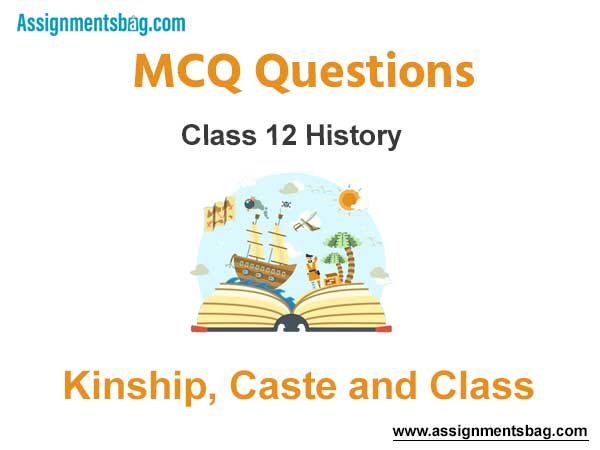Please refer to MCQ Questions Chapter 3 Kinship, Caste and Class Class 12 History with answers provided below. These multiple-choice questions have been developed based on the latest NCERT book for class 12 History issued for the current academic year. We have provided MCQ Questions for Class 12 History for all chapters on our website. Students should learn the objective based questions for Chapter 3 Kinship, Caste and Class in Class 12 History provided below to get more marks in exams.
Chapter 3 Kinship, Caste and Class MCQ Questions
Please refer to the following Chapter 3 Kinship, Caste and Class MCQ Questions Class 12 History with solutions for all important topics in the chapter.
MCQ Questions Answers for Chapter 3 Kinship, Caste and Class Class 12 History
Question. Women were allowed to retain the gifts they received on the occasion of their marriage as:
(A) stridhana
(B) manusmriti
(C) biksha
(D) None of These
Answer
A
Question. According to Manusmriti, for women, there are six means of acquiring wealth. Which one of the following statement is incorrect regarding those means?
(A) She could acquire wealth through any subsequent gift and whatever her “affectionate” husband might give her.
(B) She could acquire wealth through bridal procession .
(C) She could acquire wealth as a token of affection, and what she got from her brother, mother or father.
(D) She could acquire wealth after her husband’s death.
Answer
D
Question. Sutta Patika is a text belong to ……………. religion.
(A) Hindu
(B) Buddhist
(C) Jain
(D) None of this.
Answer
B
ASSERTION AND REASON BASED MCQs :
Question. Assertion (A): The bodies of nishadas were found charred and it was believed that the Pandavas and Kunti were dead.
Reason (R): Kunti arranged for a feast. While most of the invitees were Brahmanas, a nishada woman came with her five sons. When they were satiated with drink and fell off to sleep, the Pandavas escaped, setting fire to the house.
(A) Both A and R are true and R is the correct explanation of A.
(B) Both A and R are true but R is NOT the correct explanation of A.
(C) A is true but R is false.
(D) A is false and R is true.
Answer
A
Question. Assertion (A): Themes and episodes from the Mahabharata were depicted in sculpture, paintings, performing arts (dance, drama) and other kinds of narrations.
Reason (R): This enormous composition of Mahabharata is attributed to Sage Vyasa.
(A) Both A and R are true and R is the correct explanation of A.
(B) Both A and R are true but R is NOT the correct explanation of A.
(C) A is true but R is false.
(D) A is false and R is true.
Answer
B
Question. Assertion (A): Women can retain the gifts they received during their marriage as stridhana.
Reason (R): This can be inherited by their children. Husbands had also claim on it.
(A) Both A and R are true and R is the correct explanation of A.
(B) Both A and R are true but R is NOT the correct explanation of A.
(C) A is true but R is false.
(D) A is false and R is true.
Answer
C
Question. Assertion (A): In Tamil Sangam, men who were generous were respected, while those who were miserly or simply accumulated wealth for themselves were despised.
Reason (R): Tamil Sangam anthologies often illuminate social and economic relationships, suggesting that while there were differences between rich and poor, those who controlled resources were also expected to share them.
(A) Both A and R are true and R is the correct explanation of A.
(B) Both A and R are true but R is NOT the correct explanation of A.
(C) A is true but R is false.
(D) A is false and R is true.
Answer
A
CASE-BASED MCQs :
Question. Read the following excerpt titled “A Mother’s Advice” carefully and answer the questions:
Duryodhana
By making peace, you honour your father and me, as well as your well-wishers…it is the wise man in control of his senses who guards his kingdom. Greed and anger drag a man away from his profits; by defeating these two enemies, a king conquers the earth. You will happily enjoy the earth, my son, along with the wise and heroic Pandavas. There is no good in a war, no law (dharma) and profit (artha), let alone happiness; nor is there (necessarily) victory in the end–don’t set your mind on war.
Duryodhana did not listen to this advice and fought and lost the war.
Question. Why did Gandhari appeal to her son not to fight against the Pandavas?
(A) She knew that Pandavas will win.
(B) She knew that Kauravas will win.
(C) She knew that the war will end in a tie.
(D) She knew that it is not necessary that victory would come in war.
Answer
D
Question. Who won the war in the end?
(A) The Pandavas
(B) The Kauravas
(C) The war ended in a tie
(D) They finally entered into a treaty
Answer
A
Question. Why did Duryodhana not listen to his mother?
(A) He was overconfident
(B) He was egoistic about his powers.
(C) His advisors pushed him towards war.
(D) All of these.
Answer
D
Question. What was the cause of war between the Kauravas and the Pandavas?
(A) Right to Panchayat of Dwarka
(B) Right to throne of Hastinapur
(C) Right to enslave the other party
(D) None of these
Answer
B



